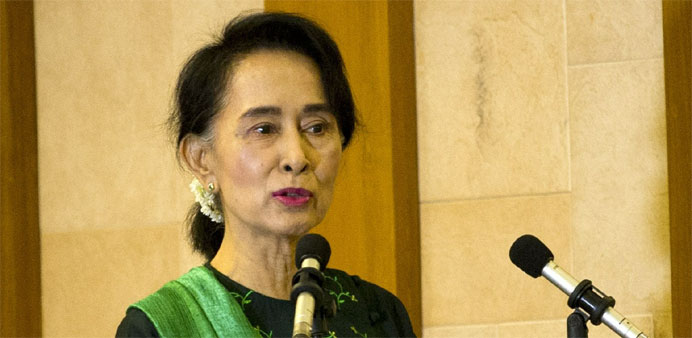Ousted Myanmar leader Aung San Suu Kyi yesterday appeared at a court hearing via video conferencing as supporters marched in several towns and cities in defiance of a crackdown after the bloodiest day since the February 1 military coup.
Police fired tear gas and stun grenades to disperse hundreds of protesters in the main city of Yangon yesterday, witnesses said.
They later combed through side streets firing rubber bullets and at least one person was hurt, media reported.
In an evening address on state television, army chief senior general Min Aung Hlaing said protest leaders and “instigators” would be punished.
The army was also investigating financial abuse by the civilian government, he said.
Suu Kyi, 75, looked in good health during her appearance before a court in the capital Naypyidaw, one of her lawyers said.
Two more charges were added to those filed against her after the coup, she said.
“I saw Amay on the video, she looks healthy,” lawyer Min Min Soe said, using an affectionate term meaning “mother” to refer to Suu Kyi.” She asked to meet her lawyer.” The Nobel Peace laureate, who leads the National League for Democracy (NLD), has not been seen in public since her government was toppled and she was detained along with other party leaders.
She was initially charged with illegally importing six walkie-talkie radios.
Later, a charge of violating a natural disaster law by breaching coronavirus protocols was added.
Two more charges were added yesterday, one under a section of a colonial-era penal code banning publication of information that may “cause fear or alarm”, the other under a telecommunications law stipulating licences for equipment, the lawyer said.
The next hearing will be on March 15.
Critics of the coup say the charges were trumped up.
Myanmar has been in chaos since the military seized power after alleging fraud in a November election that the NLD won in a landslide, with daily protests getting increasingly violent as police and troops try to stamp them out.
In his speech, read out by a newsreader on state-run MRTV, senior general Min Aung Hlaing said action would be taken against civil servants refusing to work for the junta.
He said the military was investigating what he called corruption by the civilian government, accusing the authorities of misusing money meant for Covid-19 prevention efforts.
“The respective ministries are working to find out such financial abuse,” he said, adding that action would be taken against organisations where foreign currency funds were found.
He said a committee formed by ousted lawmakers from the civilian government, which has announced the formation of a government-in-exile, was illegal and anyone associated with it would be punished.
The junta has promised a new election but not set a date.
The Committee Representing Pyidaungsu Hluttaw, whose name uses the Burmese word for the Myanmar parliament, yesterday declared the junta a terrorist group and condemned the violence against protesters as a “declaration of war on unarmed civilians”. On Sunday, police fired on crowds in several places, killing 18 people, the United Nations human rights office said.
A committee representing lawmakers elected last year said 26 people were killed but Reuters was unable to verify that.
“We have to continue the protest no matter what,” Thar Nge said after tear gas volleys from the police forced him and others to abandon a barricade in a Yangon street.
The military has not commented on Sunday’s violence and police and military spokesmen did not answer calls.
The state-run Global New Light of Myanmar newspaper warned that “severe action will be inevitably taken” against “anarchic mobs”.

Aung San Suu Kyi (file picture)
